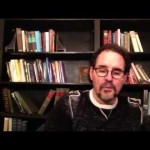We run our website the way we wished the whole internet worked: we provide high quality original content with no ads. We are funded solely by your direct support. Please consider supporting this project.
What’s the signficance of Judges 10:6-17
The Israelites rebelled against Yahweh and worshipped other gods. As a result, Yahweh withdrew his protection of them and “sold them into the hands of te Philistines and the Ammonites” (Judg. 10:6-7). The Israelites eventually acknowledged their sin and cried out to God (vs. 10) but Yahweh, perhaps perceiving that their repentance wasn’t genuine, told them he wasn’t going to rescue them and that they should go ahead a “cry out to the gods you have chosen” (vss. 13-14). The Israelites wisely responded by getting rid of their foreign gods and to serve Yahweh alone, and Yahweh, for his part, “could bear Israel’s misery no longer” (vs. 16). So the Lord changed his plan not to protect Israel and once again became their protector.
Category: Q&A
Tags: Open Theism, Q&A
Topics: Open Theism
Verse: Judges 10
Related Reading

What is the significance of 2 Kings 20:1–7?
The Lord tells Hezekiah “[Y]ou shall die: you shall not recover” (vs. 1). Hezekiah pleads with God and God says, “I will add fifteen years to your life” (vs. 6). If everything about the future was exhaustively settled and known by God as such, his prophecy to Hezekiah that he was going to die would…

Free Will: Is it a coherent concept?
Greg is going to be spending the next several blogs talking about the idea of free will. In this first reflection, he discusses whether it is coherent to speak of a decision that is not determined or exhaustively caused.

God Clearly Can, So Why Doesn’t He? (podcast)
Leah expects more from God. Should she? Greg confronts God’s inactivity and underperformance. Episode 510 http://traffic.libsyn.com/askgregboyd/Episode_0510.mp3

How do you respond to 2 Samuel 17:14–15?
“Absalom and all the men of Israel said, ‘The counsel of Hushai the Archite is better than the counsel of Ahithophel.’ For the Lord had ordained to defeat the good counsel of Ahithophel, so that the Lord might bring ruin on Absalom.” This passage is sometimes cited to support the view that God ordains all…

If God shouldn’t get blamed when free agents do evil, why should he be thanked when they do good?
Scripture tells us that every good gift comes from God the Father who “does not change like shifting shadows” (Ja 1:17). I interpret this to mean that God is always good and that he’s always working for good. In all circumstances, Paul said, “God is working for the good” (Rom. 8:28). We live and move…

Podcast: If the Future is Open How Can We Know God Wins in the End?
Greg discusses the open future and speculates on how God can still be assured victory in the end. http://traffic.libsyn.com/askgregboyd/Episode_0069.mp3
